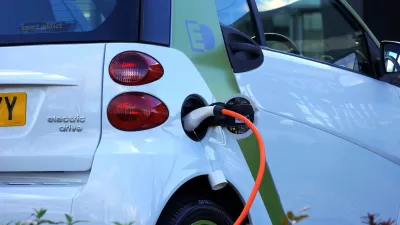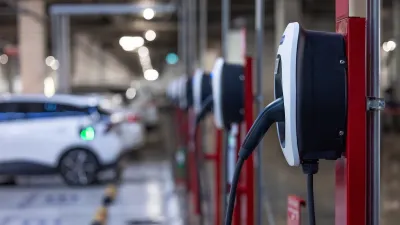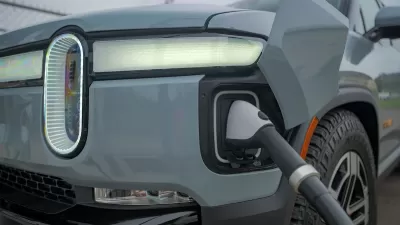A $5 billion federal investment will contribute to state efforts to install electric vehicle charging stations along interstate highways and major corridors.

The Biden administration has proposed a $5 billion investment in electric car charging with the goal of making electric vehicle infrastructure more accessible in more places, reports Ian Duncan in the Washington Post. "Officials say the federal funding is aimed at standardizing charging systems so drivers have an experience comparable to finding a gas station on a road trip." The investment falls short of the $39 billion that experts estimate is needed to build out a national public charging system by 2035, adds Duncan.
Electric vehicles are a tiny fraction of annual sales and establishing a viable network of chargers — the administration wants 500,000 — is widely seen as a vital step to convince more Americans to switch out their gas-powered cars. But it’s a job that must account for the needs of apartment and rowhome dwellers, who can’t charge on their driveway, and people traveling through rural areas, where electric grids might struggle to meet demand.
Today, there are roughly 116,000 public charging ports in the U.S., with many of them located in California. The Department of Transportation has been tasked with distributing the funding, while states are responsible for submitting plans by August 1. Guidelines established by the departments of energy and transportation recommend starting with chargers near interstate freeways, but the plan also needs to address the needs of drivers living farther from major highways. "The administration is seeking to ensure that 40 percent of the benefits of the spending accrue to disadvantaged communities and it will be up to states to demonstrate how they intend to meet that goal."
FULL STORY: Biden administration plan calls for $5 billion network of electric-vehicle chargers along interstates

Alabama: Trump Terminates Settlements for Black Communities Harmed By Raw Sewage
Trump deemed the landmark civil rights agreement “illegal DEI and environmental justice policy.”

Planetizen Federal Action Tracker
A weekly monitor of how Trump’s orders and actions are impacting planners and planning in America.

Why Should We Subsidize Public Transportation?
Many public transit agencies face financial stress due to rising costs, declining fare revenue, and declining subsidies. Transit advocates must provide a strong business case for increasing public transit funding.

Understanding Road Diets
An explainer from Momentum highlights the advantages of reducing vehicle lanes in favor of more bike, transit, and pedestrian infrastructure.

New California Law Regulates Warehouse Pollution
A new law tightens building and emissions regulations for large distribution warehouses to mitigate air pollution and traffic in surrounding communities.

Phoenix Announces Opening Date for Light Rail Extension
The South Central extension will connect South Phoenix to downtown and other major hubs starting on June 7.
Urban Design for Planners 1: Software Tools
This six-course series explores essential urban design concepts using open source software and equips planners with the tools they need to participate fully in the urban design process.
Planning for Universal Design
Learn the tools for implementing Universal Design in planning regulations.
Caltrans
Smith Gee Studio
Institute for Housing and Urban Development Studies (IHS)
City of Grandview
Harvard GSD Executive Education
Toledo-Lucas County Plan Commissions
Salt Lake City
NYU Wagner Graduate School of Public Service





























